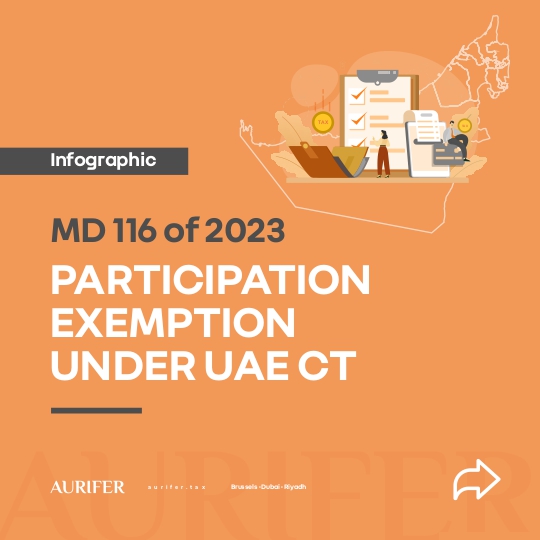

Overview Draft KSA Income Tax Law and Draft Tax Procedures Law
On 25 October 2023, the Zakat, Tax and Customs Authority (“ZATCA”) in the Kingdom of Saudi Arabia (“KSA”) published the Income Tax Law Draft (“proposed Law” or “new ITL”) in the Istitlaa Portal, which aims to update the KSA’s income tax system, currently governed by the Income Tax Law (Royal Decree No. M/1 dated 1/15/1425 AH) (“current Law”). At the same time, ZATCA also published a draft of the Zakat and Tax Procedural Law on the same platform (“draft Procedural Law”).
ZATCA proposes replacing the existing Income Tax Law with a new draft that aligns with the KSA’s evolving tax landscape, embraces global best practices to stimulate investment, and streamlines compliance and transparency. In addition, it implements defensive measures against transactions with tax havens. We summarise below the main changes to the application of corporate income tax in KSA if the proposed Law comes into force.
Tax haven blacklist
The proposed Law provides several provisions aimed at tackling profit shifting and tax avoidance. The proposed Law introduces the concept of a preferential tax regime, which is not present in the current Law. According to the proposed Article 10(2), any transaction involving a resident or permanent establishment in a jurisdiction that employs a preferential tax regime will have special provisions applicable, which are less favourable than the normal regime. These special provisions pertain to how expenses, depreciation, WHT rates, and TP regulations are applied.
A tax regime qualifies as preferential if it meets one of the conditions outlined in the proposed Article 10(3). Likely, the most prominent situation is the one where a country applies a statutory income tax rate of less than 15%. Further, a country will also be considered to have a Preferential Tax Regime if it has no information exchange agreement or if it does not have substance requirements applicable in its jurisdiction.
The jurisdictions that fall under this preferential tax regime will be determined through a decision made jointly by the ZATCA Board and the Ministry of Foreign Affairs. In other words, they will draw up a blacklist. In the region, these provisions will impact UAE, Bahrain, Qatar and Kuwait, all countries that either tax below 15% or exempt GCC-held businesses. KSA may essentially be blacklisting those countries, and policy responses will be expected from those countries.
The WHT rate for payments to such preferential regimes will always be 20%, irrespective of the type of payment. Where there is no Double Tax Treaty (“DTT”) available with the residency country, this impact is profound. In the GCC, KSA currently only has a DTT with the UAE, although negotiations for a DTT with Qatar are underway.
Other consequences include that the participation exemption may not apply when the investee is in a jurisdiction regarded as a preferential tax regime. Further, the deductibility of expenses for payments made to preferential tax regimes may be impaired, and depreciation may not be available for the purchases of assets from preferential tax regimes.
Withholding taxes
The proposed Law makes a clearer division for the application of withholding taxes. Withholding taxes will be applicable for the following payments:
- Dividends, rental payments, and interest payments: 5%
- Payments for Services: 10%
- Royalties: 15%
Currently, a more detailed analysis of the nature of the services is required to identify the applicable WHT rate. The amendment is a surprise given that a recent reform has already taken place. Since 12 September 2023, the WHT rate for technical and consultancy services between related parties was reduced to 5% from 15%. The draft Law would now bring all services to 10%. This is not a positive evolution, given the expansion of the economy and current interactions with non-resident suppliers. Companies in jurisdictions that have DTTs with KSA may seek shelter under those treaties unless they have a Permanent Establishment in KSA.
Special incentives
Article 33 of the proposed Law foresees that special tax regulations may apply. This prefaces different tax regulations related to the SEZs in KSA, the ILBZ and potentially for the RHQ in accordance with the Regional Head Quarter Regime and other potential regimes.
In the same vein, there will be deductions for R&D and incentives for Green Investments. The design of those deductions and incentives may be in line with a Qualifying Refundable Tax Credit under the Pillar Two rules. Further, the creation of an investment reserve will encourage investment in assets.
Updated Residency rules and Service Permanent Establishment
In comparison to the current Law, the residency Article in the proposed Law (Article 2) gives extended details to the residence criteria of the natural person and sets rules to count the days in this regard. According to the Article, less time is required for natural persons to meet the residency criteria. Most crucial is that a natural person will be a tax resident for Income Tax purposes where they conduct business-related activities, and their length of stay exceeds 90 days during a tax year and 270 days over the course of three years.
In relation to the concept of Permanent Establishment (“PE”), the current Law provides two forms of PE: the Fixed PE and Agency PE. However, since the KSA, in practice, has also been enforcing a Services PE based on its sourcing rules, the proposed Law explicitly adds the Service PE in Article 6(3) with a threshold period of 30 days in any 12 months. This is a low threshold, which is likely easily to be crossed. The OECD’s Model Tax Convention has no Services PE, and the UN Model Tax Convention which puts the threshold at 183 days in any 12 months. Where KSA has DTT’s, the provisions of the DTT will prevail.
Binding nature of rulings and guide and Zakat penalties
Amongst others, the draft Procedural Law imposes penalties on non-compliant Zakat payers. It also would bind ZATCA to its own administrative guidance and rulings. This removes any ambiguity for all taxpayers as they are assured they can place reliance on the Law when in force.
Non-GCC national resident persons clarified to be in scope
These provisions have caused some concern amongst expats in KSA. It was already part of the law but has been clarified. It does not constitute Personal Income Tax but rather a business tax applicable to non-GCC nationals conducting a business in KSA.
Adoption BEPS standards
In the proposed Law, Article 19 includes interest deductibility limitations different from the current rules. As per these proposed rules, the net loan charges are tax-deductible only in the tax year they arise and are capped at a maximum of 30% of the adjusted earnings. This approach is considered best practice by the OECD, recommended under BEPS Action 4 and is in line with numerous other jurisdictions.
Further, the proposed Law tackles the issue of the hybrid mismatch of financial instruments between the KSA and other jurisdictions. It rejects any discounts or tax exemptions on the financial instrument if the tax is not appropriately imposed in the other country due to varying tax treatments between the KSA and that other country. Therefore, the application of such instruments will depend on the tax regime in the corresponding country. This provision is an implementation of the recommended norms under BEPS Action 2.
Further, KSA domestically also adopts a Principal Purpose Test, a norm prescribed under BEPS Action 6.
Consistency terms and clarifications
To ensure that the proposed Law is interpreted consistently and in a unified manner, the Law provides detailed definitions for existing terms in the current Law and consolidates them into one article rather than adding them to different articles in the proposed Law.
Furthermore, the proposed Law took a further step and included interpretation rules for undefined terms in the Law, where it has a hierarchy for different legal references starting with the meaning included in the Income Tax By-Laws through to the Accounting Standard adopted in the KSA that do not contradict to the proposed Law. There are a range of other provisions also included where their impact under the current Law is unclear.
Other provisions
The proposed Law treats the Partnership as fiscally non-transparent (opaque) for Tax purposes. In the current Law, the unlimited Partnership is treated as fiscally transparent.
The proposed Law explicitly states that expenses related to Real Estate Transactions Tax (“RETT”) and non-deductible VAT paid by the taxpayer will be deductible, provided these expenses are for the purpose of generating taxable income.
In this regard, it also states that any payments to a Related Person that is not at arm’s length will exclude the excess payment from being permitted as a deduction for the purpose of the proposed Law.
The statute of limitation for audits and refunds would further become five years instead of the currently applicable three years. Exit taxes apply for removing assets from KSA.
Pillar Two and entry into force
Currently, there are no Pillar 2 rules on the Global Minimum Tax detailed in the Draft ITL, even though many large GCC-held businesses may have an ETR below 15%, considering the application of Zakat. When they have constituent entities in other jurisdictions that implement Pillar 2, these businesses may be impacted as of 1 January 2024.
The Entry into force is foreseen for 90 days after publication in the Official Gazette. The Regulations are aimed to be issued by the ZATCA Board 180 days after issuance of the Law and would immediately enter into force after publication. Given the timelines on the public consultation, this means that the Law will likely not enter into force and be applicable before Q2 2024.






















